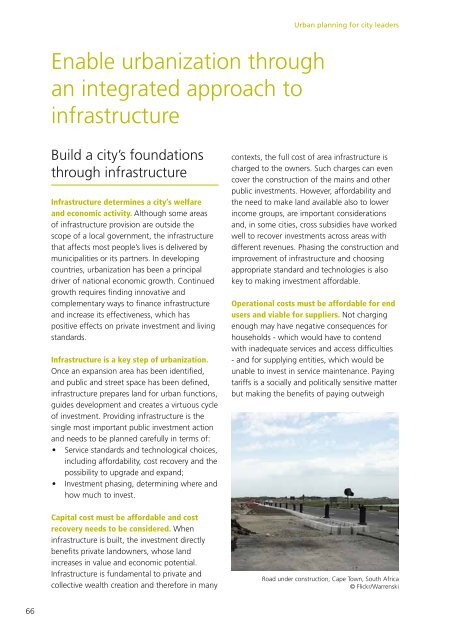Urban Planning for City Leaders - Cities Alliance
Urban Planning for City Leaders - Cities Alliance
Urban Planning for City Leaders - Cities Alliance
You also want an ePaper? Increase the reach of your titles
YUMPU automatically turns print PDFs into web optimized ePapers that Google loves.
<strong>Urban</strong> planning <strong>for</strong> city leadersEnable urbanization throughan integrated approach toinfrastructureBuild a city’s foundationsthrough infrastructureInfrastructure determines a city’s welfareand economic activity. Although some areasof infrastructure provision are outside thescope of a local government, the infrastructurethat affects most people’s lives is delivered bymunicipalities or its partners. In developingcountries, urbanization has been a principaldriver of national economic growth. Continuedgrowth requires finding innovative andcomplementary ways to finance infrastructureand increase its effectiveness, which haspositive effects on private investment and livingstandards.Infrastructure is a key step of urbanization.Once an expansion area has been identified,and public and street space has been defined,infrastructure prepares land <strong>for</strong> urban functions,guides development and creates a virtuous cycleof investment. Providing infrastructure is thesingle most important public investment actionand needs to be planned carefully in terms of:• Service standards and technological choices,including af<strong>for</strong>dability, cost recovery and thepossibility to upgrade and expand;• Investment phasing, determining where andhow much to invest.Capital cost must be af<strong>for</strong>dable and costrecovery needs to be considered. Wheninfrastructure is built, the investment directlybenefits private landowners, whose landincreases in value and economic potential.Infrastructure is fundamental to private andcollective wealth creation and there<strong>for</strong>e in manycontexts, the full cost of area infrastructure ischarged to the owners. Such charges can evencover the construction of the mains and otherpublic investments. However, af<strong>for</strong>dability andthe need to make land available also to lowerincome groups, are important considerationsand, in some cities, cross subsidies have workedwell to recover investments across areas withdifferent revenues. Phasing the construction andimprovement of infrastructure and choosingappropriate standard and technologies is alsokey to making investment af<strong>for</strong>dable.Operational costs must be af<strong>for</strong>dable <strong>for</strong> endusers and viable <strong>for</strong> suppliers. Not chargingenough may have negative consequences <strong>for</strong>households - which would have to contendwith inadequate services and access difficulties- and <strong>for</strong> supplying entities, which would beunable to invest in service maintenance. Payingtariffs is a socially and politically sensitive matterbut making the benefits of paying outweighRoad under construction, Cape Town, South Africa© Flickr/Warrenski66
















